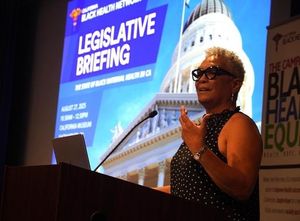Washington D.C. was shaken this week by the nation's deadliest air disaster in two decades, resulting from the shocking collision between an American Airlines regional jet and an Army Black Hawk helicopter. Tragically, the disaster claimed the lives of 67 individuals, prompting President Donald Trump to swiftly assign blame, primarily targeting the Federal Aviation Administration's (FAA) diversity hiring initiatives.
During a news conference from the White House, Trump asserted, "But certainly for an air traffic controller, we want the brightest, the smartest, the sharpest. We want somebody that's psychologically superior." He elaborated on his belief, indicating he thought diversity efforts had undermined the FAA's effectiveness, claiming these initiatives encouraged recruitment without adequate concern for the qualifications of potential candidates.
"The FAA is actively recruiting workers who suffer severe intellectual disabilities, psychiatric problems, and other mental and physical conditions under a diversity and inclusion hiring initiative," Trump stated, though there is no evidence linking diversity hiring practices to the collision, and experts overwhelmingly reject this theory.
Trump's comments especially drew ire from Democrats and civil rights advocates. Senator Tammy Duckworth, who lost both legs serving as a Black Hawk helicopter pilot during the Iraq War, voiced her outrage on social media, stating, "There are still bodies being pulled from the Potomac River. Families are grieving the loss of loved ones. Yet Donald Trump is baselessly blaming DEI for last night’s tragic collision. Absolutely shameful." This sentiment was echoed across social media platforms, where individuals called for respect during such tragic times.
Even National Transportation Safety Board (NTSB) Chair Jennifer Homendy emphasized the investigation would examine all relevant factors, saying, "We look at facts, on our investigation, and it will take some time." She firmly stated, "That is standard," underlining the importance of focusing on the actual technical and operational elements of the crash rather than scapegoats.
Throughout the week, Trump signed executive orders aimed at dismantling diversity-focused recruitment programs established under previous administrations. During the press briefing, he reiterated, "We want the most competent people; we don’t care what race they are." This narrative of competence over diversity drew sharp distinctions along party lines, with Republicans praising Trump's leadership and Democrats criticizing it as political maneuvering.
The FAA has long faced scrutiny over staffing shortages among air traffic controllers, which have only worsened since the COVID-19 pandemic. Reports noted concerns about overtaxed systems, citing close calls between planes at U.S. airports. Homendy previously reported these alarming trends to lawmakers, illustrating the rising stresses on aviation safety systems.
Trump's comments also brought scrutiny to the FAA's recruitment strategies, which, though historically criticized for being heavily male and predominantly white, have aimed to improve diversity across the workforce. The agency stated it seeks to hire qualified candidates, issuing rigorous qualifications regardless of candidates' backgrounds. Nevertheless, Trump's wild assertions raised alarms among civil rights groups, causing them to push back against what they condemned as harmful stereotypes against disabled individuals.
"The implication people are being hired to do jobs for which they are unqualified is an unfounded lie," stated groups representing disabled workers, emphasizing the rigorous standards maintained by the FAA.
Several legislators joined the chorus denouncing Trump's comments. Senator Dick Durbin directly criticized him, asserting, "The American people deserve real answers, not narcissistic speculations."
The political fallout also highlighted the impact of Trump's rhetoric on civil discussions around workplace diversity, particularly within sensitive contexts such as aviation safety. Experts and lawmakers alike have called Trump's linking of diversity to aviation safety "an illogical leap," underlining the lack of substantiated evidence connecting the FAA's diversity efforts to the recent disaster.
Many aviation professionals have underscored the need for increased staffing and modernization of equipment and technology at the FAA, arguing these issues are far more relevant to ensuring safety than discussions surrounding the demographics of air traffic controllers.
Despite the chaos of the moment and the undeniable human losses of the tragedy, it appears discussions surrounding diversity and inclusion will remain contentious, feeding directly back to the broader political dynamics at play as officials face calls to probe the incident without drawing unfounded connections to diversity initiatives.
Senator Ruben Gallego also remarked on the urgency for the administration to focus on practical outcomes and solutions. "DEI did not cause this tragedy," he firmly stated, reinforcing the viewpoint shared by many on both sides of the aisle.
While investigations continue to unravel the details of the crash and the challenges within the aviation system remain, the comments from Trump and their repercussions serve as stark reminders of the need for focused discussions on safety and competence, rather than divisive political narratives. The families impacted and the public at large have quite clear expectations of their leaders at this time: accountability, transparency, and, most significantly, respect for those grieving.



